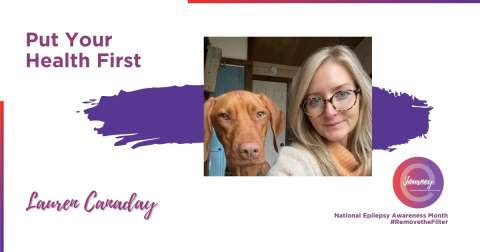Put Your Health First

By Lauren Canaday
When I was 34 years old, during an especially exciting and fulfilling time in my life, I suddenly had a generalized tonic-clonic seizure in the middle of my grad school classroom. My professor called an ambulance. Despite 14 witnesses describing a classic "grand mal," doctors in the emergency room assumed that I must have fainted given my age and lack of history.
Several days later, I was sitting in the driver's seat of my car about to pull out of a parking space, I had a second and much more debilitating seizure. It took me hours to recover the ability to speak and move my limbs. I was placed on anti-seizure medication while doctors worked to gradually rule out every other health problem under the sun. It took eight months to get my medication dosage right, but I have now been seizure-free for more than two years.
Despite getting multiple opinions and joining a study at the National Institute of Health, no abnormal brain activity is detected in my EEGs and no abnormalities can be found on MRIs. I have often wondered if my seizures are complex migraines, as I've suffered from crippling headaches, temporary blindness, and inability to form sentences from migraines as far back as I remember. Yet, witnesses for various seizures describe classic seizure symptoms, and the medication I take works to control them in my situation. So, I’ve gradually come to accept my diagnosis and the lifelong role medication will play in its management.
Compared to many people in my support group, I often feel fortunate that my seizures are controlled with one medication. On the other hand, it has been an emotional roller coaster and often almost unbearable to accept the side effects. It is difficult to adjust to a slower, calmer life that keeps me below my seizure threshold. Since I want to stay at my current dose, I do everything I can to raise my threshold naturally: avoid alcohol, avoid gluten, which is a suspected trigger of both migraine and seizures for me, and exercise regularly. I prioritize sleep above all else.
Due to my epilepsy, I have faced a number of challenges that some people may never face. I left behind an intensive management role and grad school program involving travel to secure a steady job with more leave and better health insurance. I have to limit any experience that requires heavy multitasking because my brain gets exhausted quickly. I have had to wear glasses since starting anti-seizure medication, despite having better than 20/20 vision immediately beforehand. I take copious notes because my memory and word recall are unreliable. I feel like I aged 20 or 30 years overnight. Aging is hard for everyone, but imagine it happening so fast that there was no time to adjust.
Despite these challenges, I have built a new life, but I often miss the carefree, driven, energetic person I was before my first seizure. I also miss the rich social life I had. One by one, most of my friends and family members pulled away once I started keeping a strict self-care routine and stopped drinking alcohol. Most of all, nobody wanted to hear about the psychological impact of my sudden life change.
There was little support from those people closest to me because of the invisible symptoms I experienced. Therapy helped me process this grief. I learned to refocus on building new relationships with people who are able to accept me as my full self, which includes my epilepsy.
I discovered that there are a lot of supportive people in this world. I just had to proactively go looking for them by joining a support group and setting different criteria for my relationships. I married an amazing man in July who understands and supports me in my journey.
I have tried to turn what was a negative experience into a positive one and the first year I had epilepsy, I resolved to get involved by creating a walking group. Building awareness about epilepsy has been very healing for me.
Epilepsy is something that happens to a person, but it is only part of the definition of you. Remember, you still have one important thing: control over how you manage it. Defy culture and individuals who judge you for being different and put your health first. This is both your responsibility and your gift to yourself.
Reviewed By: Sara Wyen
